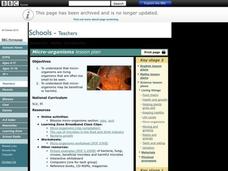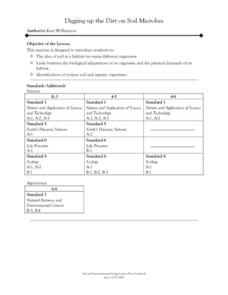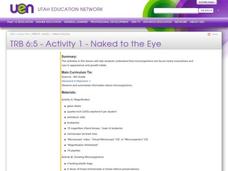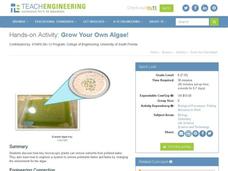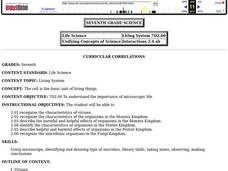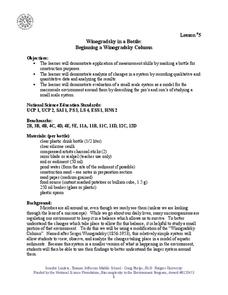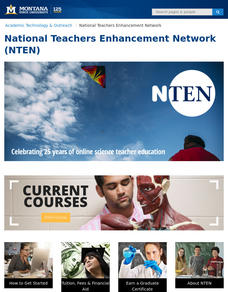Howard Hughes Medical Institute
What van Leeuwenhoek Saw
When van Leeuwenhoek saw cells and single-celled organisms for the first time, he knew these small things were a big deal! Share his discoveries with young learners through a narrated video, model-building activity, and scale study....
Curated OER
Micro-Organisms
Students investigate microscopic life by viewing video clips. In this organisms lesson, students view photographs and video clips on the internet of micro-organisms and discuss the harms and benefits of the creatures. ...
Polar Trec
Drawing Diatoms like Ernst Haeckel
Why do scientists rely on drawings rather than just photographs of their research studies? The lesson introduces drawings of microscopic organisms and the importance of accuracy. Young artists draw organisms and learn why focus and...
Curated OER
Digging up the Dirt on Soil Microbes
Students are introduced to the idea of soil as a habitat for many different organisms. They are introduced to the links between the biological adaptations of an organism and the physical demands of its habitat. Pupils are introduced to...
Curated OER
Winogradsky in a Bottle: Beginning a Winogradsky Column
Students use their measurement skills by marking a bottle for construction purposes. They record qualitative and quantitative data and analyze their results. Students demonstrate evaluation of a small scale systems as a model for the...
Curated OER
Images of Our Changing Earth
Students identify and explain that remote sensing can detect changes on the Earth's surface that occur over time, and name at least three: urbanization, deforestation, and succession. They select a global change issue to investigate and...
Curated OER
Microorganisms: Good Guys or Bad Guys?
Students discover the role microorganisms play in our lives. In this decomposition lesson, students examine decaying foods and plants in order to analyze the different bacteria that grows. Students discuss the good and bad of...
Curated OER
Eutrophication Experiments
Observe two different water samples and write down observations. Write a paragraph which predicts the relative amounts of nutrients, nitrates, and phosphates in the water samples. Compare water samples under a microscope.
Curated OER
Using A Winogradsky Column to Analyze Microbial Communities
Students use easily obtained materials to study ecological succession in a microbiological community. They collect water samples from outdoor sources in plastic bottles to observe and record changes.
Curated OER
Naked to the Eye
Sixth graders conduct a variety of experiments that enable them to investigate bacteria. They use microscopes, prepared slides, video, moldy bread and pond water to observe types of bacteria and how bacteria interacts with the...
Teach Engineering
Grow Your Own Algae!
Develop a model of a wastewater treatment center. The last activity of the unit has pupils mix a lake water sample into a tank of water containing fertilizers. Over time, the algae from the lake water grows and removes the nutrient-rich...
Science Matters
Matter Cycles — Sum It Up
Scholars become part of the cycle of matter with a reader's theater that showcases producers, consumers, decomposers, and the sun. A diagram and discussion concludes the learning experience and enhances comprehension.
Curated OER
Smears
In this biology worksheet, students are shown how to prepare a smear and then answer some review questions that address the proper preparation of a sample.
Curated OER
What is all the Fuss about?
Students brainstorm a list of science discoveries and inventions that they think are important. They work in small groups, students examine 1-3 science discoeries more closely. Each group needs a recorder, and they answer three...
Curated OER
Now You See It, Now You Don't
Students explore organic and inorganic objects. In this environmental lesson students perform a composting experiment using flowers in different soils. Students record their observations.
Curated OER
Cells
Seventh graders look up pictures of viruses or pictures of models of viruses. Using pipe cleaners, beads, Styrofoam or other available materials make models of these shapes. They then observe a demonstration to show the effect of Tobacco...
Curated OER
Inquiry-based Investigations into Pond Water Microorganisms
Students become familiar with common microorganisms and experience exploring the microbial world.
Curated OER
Observing Compost Invertebrates
Second graders examine compost piles and what invertebrates help decompose the organic matter. In this compost invertebrates lesson students collect invertebrates found in a compost pile and examine them.
Curated OER
Innovations in Surgery and Reproductive Health
Students examine significant innovations in surgery and reproductive health. In this surgery instructional activity students view a video and answer the given questions.
Curated OER
Winogradsky in a Bottle: Beginning a Winogradsky Column
Students study changes in the environment using a microscale experiment. In this environmental science activity, students construct a modified "Winogradsky Column" to observe bacteria activities. They record observations and formulate a...
Curated OER
Life in Streams and Ponds
Students collect microorganisms, demonstrate correct laboratory/Gram stain procedure, and design and construct tables to organize data.
Curated OER
How Did That Get in My Lunch?
Students view "The Danger Zone" to learn about food poisoning and the bacterial causes and prevention. Students look at slides, use a worksheet, "Microbial Bugs"and the internet to identify and learn about each bacterium.
Curated OER
Decomposers at Work!
Students design and conduct investigations that illustrate the process of decomposition. After a lecture/demo, students simulate the process of soil composting in the classroom. They closely chart the decomposition of their soil.
Curated OER
Bioremediation
Students design and conduct investigations that illustrate the effect bioremediation has on organic matter and determine environmental applications. They, in groups, present their findings to the class.

